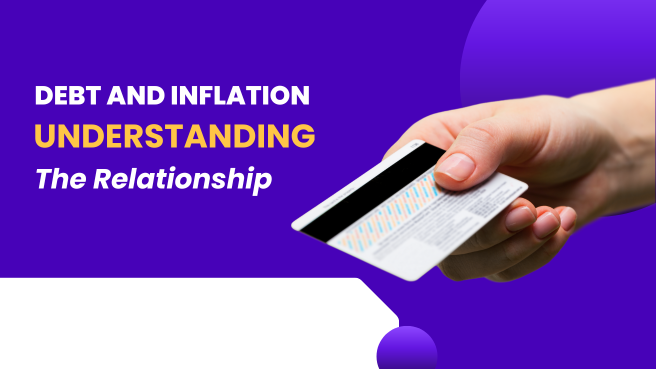Debt and inflation are two of the most important economic forces that often meet to build complex dynamics. The impact of this relationship is avoidable regardless of if you are running a business or government or are just an individual.
But why bother about this at all? Well, studying and understanding this relationship is key to understanding an investment scenario and making informed choices. In fact, this becomes even more important, with studies showing that the retaliation between debt and inflation varies from one country to another.
So, what is this relationship all about that makes it such an intriguing subject? This is exactly what I will clarify in this blog while giving you better insight into making informed investment decisions.
What Are Debt and Inflation All About?
Inflation is a common phenomenon where the prices of goods and services increase over time. The simple logic behind this is that your money loses its worth, and the same commodity or service will become more expensive than it was earlier. But in reality, inflation really is not as bad as it sounds because a certain level of inflation is necessary for economic progress.
Debt, on the other hand, is something completely different. Debt is basically the money or funds you borrow from others for a given time period. Very often, you will need to pay interest on the borrowed sum. So, unless and until the lender forgives your debt, you will owe them the borrowed principle along with the interest.
How Does Debt Affect Inflation?
Debt is often associated with regulating the supply of money in the market. So naturally, if more
people can easily access debt, the availability of money will increase in the market. If authorities fail to keep a check on this money supply, the law of demand and supply will kick in, increasing overall inflation.
However, the relationship between these two players does not end here since higher inflation rates also reduce economic progress. The logic here is that people taking more debt will also need to spend more on repaying this debt, leaving them with less funds to spend on other things. This will slow down your economy, which again contributes to increasing inflation.
How Does Inflation Affect Debt?
In my opinion, the relationship between debt and inflation is truly reciprocal because even inflation can affect debt in many ways. This includes both positive and negative impacts, depending on what you are talking about. The positive impact means increased inflation reduces the real value of existing debt over time. As a result, as prices increase, the value of money also reduces, making it easier to clear off your debt.
However, the positives end here because increased inflation also contributes to economic uncertainty, which is definitely bad news for everyone. Then comes the role of central banks that often increase interest rates to better manage inflation. Both these scenarios bring in bad news for existing debtors who now struggle to clear their debt.
Can We Balance Debt and Inflation?
They say nothing is impossible, but striking the right balance between debt and inflation is truly a significant challenge, if not impossible. It is for the policymakers to evaluate different aspects of the market to find the right balance.
In my opinion, the right balance here is to keep debt at an appropriate level so as to ensure it
does not increase inflation. Then again, it is also important to keep a check on inflation since higher inflation also makes it challenging for existing debtors to meet their debt obligations.
Conclusion Thoughts
Finance is a complex subject, but understanding the relationship between debt and inflation takes this complexity to a new level. However, once you get an idea of how this relationship works, making the right investment choices will become much easier for you. So, make sure to remain mindful of this information and seek assistance from the top debt consolidation service to navigate through times of high inflation.







